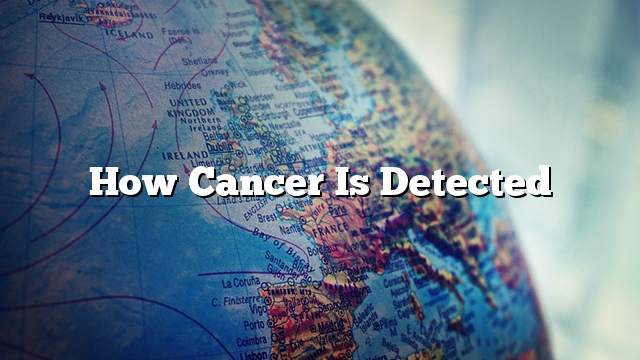cancer
Cancer is defined as abnormal growth of one of the tissues of the body, so it affects the various organs of the body, and the symptoms vary according to the tissue or the affected member, and there are many general symptoms that appear with the presence of this disease, such as: loss of appetite, weight, However, these symptoms do not necessarily mean cancer, may accompany any other disease, so you should go to the doctor, for some medical tests, to detect the disease, and this is what we will mention in this article.
How cancer is detected
breast cancer
Signs of Breast Cancer:
- Detecting a lump in the breast, or a slight reduction, or crease, or TSMC in the skin.
- Blood fluid from one nipple.
Factors that increase the risk of breast cancer:
- Aging.
- Delayed menopause, or early puberty.
- Inability to have children or have one child after 30 years of age.
- A family member is infected with breast cancer, colon cancer, or uterine cancer.
- Discontinuation of menstrual cycle.
How to detect early:
- A personal examination of the breast starting at the age of twenty.
- Mammogram taken from the age of 40 years.
- Medical examinations are conducted every three years, between the ages of 20 and 40.
Colon and rectal cancer
Signs of colon cancer:
- Note blood in the stool.
- Chronic constipation, or severe diarrhea.
- Pain or abdominal pressure.
Factors that increase the risk of colon cancer:
- A family member has colon cancer.
- Smoking.
- Low fiber diet, many fat.
- Laziness, and physical inactivity.
- Inflammation of ulcerative enteritis.
How to detect early:
- Medical examinations for faeces every year starting at the age of fifty.
- Perform a colonoscopy examination every 10 years and take a double barium injection every five years.
- X-ray examination after the age of fifty every five years.
Endometrial cancer
Factors that increase the risk of endometrial cancer:
- Exposure to estrogens.
- Obesity.
- Inability to reproduce.
- Women with ovarian cancer, or breast cancer.
- Injury of a family member.
- Menopause in menopause.
How to detect early:
- Conducting annual medical examinations for the pelvis starting from age 40.
- Taking a sample of the lining of the uterus after the interruption of the menstrual cycle, especially for women most vulnerable to infection.
Cervical cancer
Signs of cervical cancer: Note bleeding after intercourse, or between menstrual cycles.
Risk factors for cervical cancer:
- The practice of sexual intercourse at an early age.
- Exercise a sexual relationship with more than one person.
- Smoking addiction.
How to detect early:
- Conduct medical examinations for cervical lining, and check the pelvis annually from the age of 18 or earlier if the girl has sexual intercourse before this age.
- An injection called Gardasil prevents the infection of four types of HPV, one of the main causes of cervical cancer.
Prostate Cancer
Signs of prostate cancer:
- ED.
- Pain when urinating.
- Inability to start urinating, or finishing.
- Note blood in the urine.
- Note: These symptoms may indicate problems in the prostate, not cancer, so check with your doctor.
Risk Factors for Prostate Cancer:
- Aging.
- A family member has been diagnosed with cancer before.
- People of African descent are more likely to develop prostate cancer.
- Dieting contains a lot of fat.
How to detect early:
- Digital rectal examination after the age of fifty annually.
